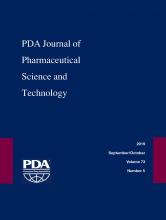Abstract
More than at any other moment in our history, it is imperative that we maintain fidelity to sound science and ensure the correct use of the associated scientific vocabulary. This is especially the case with respect to pharmaceutical microbiology and its practice in ensuring adequate controls in the manufacture of safe and efficacious therapeutics. Here, the current state of challenges and headwinds to pharmaceutical microbiology and how these are intimately linked with fidelity to sound science and the correct use of the associated scientific vocabulary are described. This is illustrated through the specific example of a misuse of the term “microbial contamination” within regulatory guidance and the adverse consequences that all stakeholders (patients, prescribers, industry, regulators, standard setting bodies) will encounter.
LAY ABSTRACT: More than at any other moment in our history, it is imperative that we maintain a fidelity to sound science and ensure the correct use of the associated scientific vocabulary. This is especially the case with respect to pharmaceutical microbiology and its practice in ensuring adequate and effective controls in the manufacture of safe and efficacious therapeutics. Here, the current state of challenges and headwinds to pharmaceutical microbiology and how these are intimately linked with fidelity to sound science and the correct use of the associated scientific vocabulary are described. This is illustrated through the specific example of a misuse of the term “microbial contamination” within regulatory guidance and the adverse consequences that all stakeholders (patients, prescribers, industry, regulators, standard setting bodies) will encounter.
- © PDA, Inc. 2019
PDA members receive access to all articles published in the current year and previous volume year. Institutional subscribers received access to all content. Log in below to receive access to this article if you are either of these.
If you are neither or you are a PDA member trying to access an article outside of your membership license, then you must purchase access to this article (below). If you do not have a username or password for JPST, you will be required to create an account prior to purchasing.
Full issue PDFs are for PDA members only.
Note to pda.org users
The PDA and PDA bookstore websites (www.pda.org and www.pda.org/bookstore) are separate websites from the PDA JPST website. When you first join PDA, your initial UserID and Password are sent to HighWirePress to create your PDA JPST account. Subsequent UserrID and Password changes required at the PDA websites will not pass on to PDA JPST and vice versa. If you forget your PDA JPST UserID and/or Password, you can request help to retrieve UserID and reset Password below.






